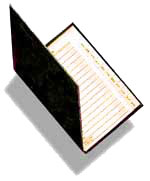
|
||
|
|
Basics
Start Here
Anglicans Believe ...
The Prayer Book
The Bible
News
News Centre
News Archive
Newspapers Online
Official Publications
Resources
Resources A to Z, including
Biblical Study
Book of Common Prayer
Books and Magazines
Exchanges
Events
Liturgy
Music
Religious Orders
Preaching
Theology
Youth
Worldwide Anglicanism
Anglican Communion
In Full Communion
Not in the Communion
Dioceses and Parishes
Africa
Australia
Canada
England
Europe
Ireland
Japan
New Zealand
Scotland
USA
Wales
World
Anglicans Online
Archives
Add a Site to AO
Tell Us What You Think
Link to AO
Staff
Awards and Publicity
Beginnings, AO Today
Our Sponsors
 Hallo
again to all.
Hallo
again to all.
It's the silly season—what better time for scandal? It's easy to assume that the church has always been preoccupied with sexual sin, to the exclusion of every other sort of naughtiness. Certainly our News Centre often seems to be top heavy with articles about sex and sexuality. But in the early 19th-century Church of England, greed loomed larger than sex.
'The Extraordinary Black Book', compiled by John Wade, was first published in 1820 with the title 'Corruption Unmasked'. It was a serious analysis of the abuse of patronage and power, as its later subtitle suggested: 'An Exposition of Abuses of Church and State, Courts of Law, Representation, Municipal and Corporate Bodies; with a Precis of the House of Commons, Past, Present, and to Come'.
This 'fascinating exposé went into numerous editions', as a current bookseller's description has it, 'in which Wade names names, listed unearned compensations, pointed out abuses of patronage, the milking of foundations, political logrolling, influence peddling and other conduct, all of which has a curiously modern ring. "Religion a trade, justice a trade, government a trade—all for money; nothing for the public good."' The sales of the Black Book were said to approach 50,000 copies.
Much of the analysis was given over to the abuses of advowsons and sinecures, with chapter headings such as 'Rapacity of the Clergy Exemplified'. And exemplified it was, in the daily newspapers:
An American bishop, Dr Hobart, during his sojourn in this country, felt much scandalised by reading the following details of secular traffic in the Morning Chronicle:
Description Estimated
Annual
IncomeAge of
IncumbentSold for Wanstead Rectory 62 Woodford -do- 58 Gt Paindon -do- 63 Fifield -do- 59 Rochford -do- 62 Filstead Vicarage 50 Roydon -do- 46
The biddings appeared to be governed by the age and health of the incumbents, residence, situation, and other local circumstances, with which the parties interested appeared to be well acquainted'. (The Extraordinary Black Book, page 20)
Clerical financial wheelings and dealings often occurred at Garraway's Coffee House in London, where even the sober Hansard (Parliamentary Reports) noted that advowsons were sold. Sabine Baring-Gould, in Church Revival, cites the story of the incumbent and patron who shammed a fatal illness, sold the advowson dearly, recovered his health the same day, and eventually made over £2,000 on the deal.*
What difference did the Black Book make? Historians have concluded that it certainly contributed to the passing of the landmark 1832 Reform Bill, which swept away the most flagrant abuses of power and patronage. But then, of course, the next church-related scandal loomed: the strange case of the Deceased Wife's Sister.
We can't claim patronage or nepotism: Gillian Barr is not related, in any degree, to current Anglicans Online staff, but we're delighted to welcome her as the editor of our recently-revamped Christian Education and Ministries section. A lifelong Episcopalian, Gillian is the Parish Education Director at Calvary Episcopal Church in Rochester, Minnesota, USA. She's been responsible for Christian formation for all ages in Presbyterian and Episcopal congregations, and holds an MDiv from Princeton Seminary, where she focused on approaches to adult formation.
And before you leave AO, do turn to New This Week, which is filled with much more than you might expect in these late-summer days of the northern hemisphere.
See you next week.
 |

|
| Cynthia McFarland cmcf@anglicansonline.org |
reid@anglicansonline.org |
Last updated: 12 August 2001
URL: http://anglicansonline.org/
*A History of the English Clergy, by C. K. Francis Brown (1953), is the source of much of this information.